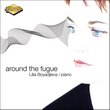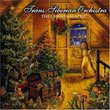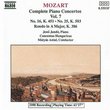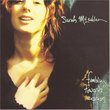| All Artists: Tchaikovsky Title: Boris Tchaikovsky: Symphony 1 Members Wishing: 0 Total Copies: 0 Label: Naxos Original Release Date: 1/1/2007 Re-Release Date: 1/30/2007 Genre: Classical Style: Symphonies Number of Discs: 1 SwapaCD Credits: 1 UPC: 747313019571 |
Search - Tchaikovsky :: Boris Tchaikovsky: Symphony 1
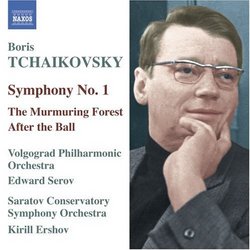 | Tchaikovsky Boris Tchaikovsky: Symphony 1 Genre: Classical
|
Larger Image |
CD DetailsSimilar CDsSimilarly Requested CDs
|
CD ReviewsEarly works of profound and powerful composer Peter Khristov | 02/25/2007 (5 out of 5 stars) "It's a big deal that this works are available now. Probably for someone who is listening to Boris Tchaikovsky music for the 1st time his early works could be just associated with Shostakovich (who really influenced him as a teatcher). But to see only Shostakovich influence in Boris Tchaikovsky's music is like, for example, to see only Haydn influence in Mozart's. Knowing Boris Tchaikovsky's mature output, such as 2d, 3d and 4th Symphonies, Piano-, Violin- and Cello Concertos, "Theme & 8 variations", "The Wind of Siberia", "Juvenile", "Music for Orchestra" and a lot of chamber music one could have a vision of an absolutely independent, profound and all-powerful composer, maybe even more profound and more universal than his acclaimed professor. Although his 1st Symphony is not that dramatic and grotesque-tickle as Shostakovich's, sometimes it containes such a beautiful pure-minded feeling of unfathomable sky and stars above I'm not sure Shostakovich ever had. Boris Tchaikovsky was a pure musician, like Schubert, Faure ore his famous namesake, and not only his symphony but his music for radio plays showes how the nature of music was obedient to him. Recordings are really good (especially suites). I really recomend to make the acquaintance of this greate composer, and I understand that this particular cd could be not the first one to take a closer look at him. You could check Chandos cd with "Sebastopol Symphony" and other orchestral works, another Naxos release with Concertos for Piano and Clarinet and with gorgeous "Signs of Zodiac" for soprano and chamber orchestra, Hyperion cd with chamber orchestra music or number of other cd's released by smaller labels." If You Like Shostakovich and Prokofiev ... J Scott Morrison | Middlebury VT, USA | 02/19/2007 (4 out of 5 stars) "... you'll probably like this issue. Boris Tchaikovsky -- no kin to THE Tchaikovsky -- was born in 1925 and lived until 1996. He was a pupil of, among others, Shostakovich and the 1949 First Symphony, presented here, was lauded to the skies by Shostakovich who arranged for its premiere to be conducted by no less than Yevgeniy Mravinsky. But the political climate made that impossible and its first hearing didn't occur until 1962. This is its first recording. At first hearing it sounds like Shostakovich Lite, but on repeated listening one hears more individuality, mainly in the use of far-ranging tonality and the use of many principal themes in what is otherwise a fairly normal sonata-allegro first movement. Still, the ambit is certainly that of Shostakovich. The edge is less sharp, the drama less deep, the humor a little less grotesque, and there are some sweet-tart harmonic processes that sound more like Prokofiev than Shostakovich. It is masterfully orchestrated, especially considering that this was a conservatory graduation piece. The second movement, a Scherzo, has Russian folk-tune colorings and very sophisticated use of rhythm (which turns out to be a hallmark of Tchaikovsky's works). The Largo is a simple ABAB bipartite form with elaboration as well as condensation when the A & B return. Its general tone alternates dramatic and tender moods. The Finale is an engaging set of variations on a sinuous theme initially presented by the clarinet. One of the variations is a fugue, another features a trumpet solo calling to mind the bullring. The work is given a fine performance by the Volgograd Philharmonic under Edward Serov.
The other two works were originally written to accompany radio plays. They have memorable melodies and creative use of rhythm. The music for 'The Murmuring Forest' was written for a dramatization of a novel by Korolenko that describes the oppression of the poor by the rich in Czarist times. Presented here is a suite arranged from the complete score which apparently was missing until found in an archive in 2003. We are not told who made the arrangement of the suite. The music is haunting and dramatic, entirely tonal and played well by the Saratov Conservatory Symphony Orchestra under Kirill Ershov. The suite from 'After the Ball' (for a dramatization of a short story by Tolstoy) is notable for the luscious Waltz which could have been written by Prokofiev (or even the earlier Tchaikovsky, although there are some added note harmonies that he might have shunned). And it ends with a March that almost sounds cribbed from 'Lieutenant Kije' except here Prokofiev's cornet is replaced with a piccolo. This Suite is in a lighter vein than the preceding works and is given a rousing performance by the Saratov band. This is probably not great music, although I've grown quite fond of the Symphony. It certainly deserves to be heard and I'd recommend it for the mildly adventurous who would like to hear music in the styles I've mentioned. Scott Morrison " |

 Track Listings (16) - Disc #1
Track Listings (16) - Disc #1
